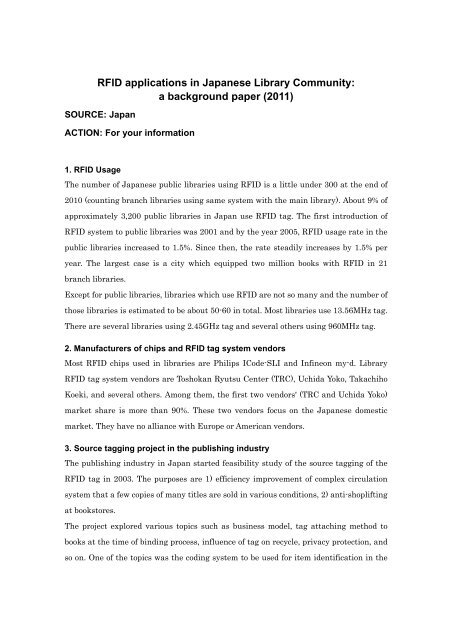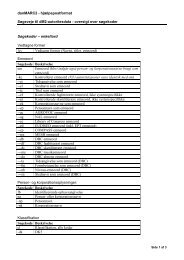RFID applications in Japanese Library Community: a ... - biblstandard
RFID applications in Japanese Library Community: a ... - biblstandard
RFID applications in Japanese Library Community: a ... - biblstandard
You also want an ePaper? Increase the reach of your titles
YUMPU automatically turns print PDFs into web optimized ePapers that Google loves.
<strong>RFID</strong> <strong>applications</strong> <strong>in</strong> <strong>Japanese</strong> <strong>Library</strong> <strong>Community</strong>:<br />
a background paper (2011)<br />
SOURCE: Japan<br />
ACTION: For your <strong>in</strong>formation<br />
1. <strong>RFID</strong> Usage<br />
The number of <strong>Japanese</strong> public libraries us<strong>in</strong>g <strong>RFID</strong> is a little under 300 at the end of<br />
2010 (count<strong>in</strong>g branch libraries us<strong>in</strong>g same system with the ma<strong>in</strong> library). About 9% of<br />
approximately 3,200 public libraries <strong>in</strong> Japan use <strong>RFID</strong> tag. The first <strong>in</strong>troduction of<br />
<strong>RFID</strong> system to public libraries was 2001 and by the year 2005, <strong>RFID</strong> usage rate <strong>in</strong> the<br />
public libraries <strong>in</strong>creased to 1.5%. S<strong>in</strong>ce then, the rate steadily <strong>in</strong>creases by 1.5% per<br />
year. The largest case is a city which equipped two million books with <strong>RFID</strong> <strong>in</strong> 21<br />
branch libraries.<br />
Except for public libraries, libraries which use <strong>RFID</strong> are not so many and the number of<br />
those libraries is estimated to be about 50-60 <strong>in</strong> total. Most libraries use 13.56MHz tag.<br />
There are several libraries us<strong>in</strong>g 2.45GHz tag and several others us<strong>in</strong>g 960MHz tag.<br />
2. Manufacturers of chips and <strong>RFID</strong> tag system vendors<br />
Most <strong>RFID</strong> chips used <strong>in</strong> libraries are Philips ICode-SLI and Inf<strong>in</strong>eon my-d. <strong>Library</strong><br />
<strong>RFID</strong> tag system vendors are Toshokan Ryutsu Center (TRC), Uchida Yoko, Takachiho<br />
Koeki, and several others. Among them, the first two vendors' (TRC and Uchida Yoko)<br />
market share is more than 90%. These two vendors focus on the <strong>Japanese</strong> domestic<br />
market. They have no alliance with Europe or American vendors.<br />
3. Source tagg<strong>in</strong>g project <strong>in</strong> the publish<strong>in</strong>g <strong>in</strong>dustry<br />
The publish<strong>in</strong>g <strong>in</strong>dustry <strong>in</strong> Japan started feasibility study of the source tagg<strong>in</strong>g of the<br />
<strong>RFID</strong> tag <strong>in</strong> 2003. The purposes are 1) efficiency improvement of complex circulation<br />
system that a few copies of many titles are sold <strong>in</strong> various conditions, 2) anti-shoplift<strong>in</strong>g<br />
at bookstores.<br />
The project explored various topics such as bus<strong>in</strong>ess model, tag attach<strong>in</strong>g method to<br />
books at the time of b<strong>in</strong>d<strong>in</strong>g process, <strong>in</strong>fluence of tag on recycle, privacy protection, and<br />
so on. One of the topics was the cod<strong>in</strong>g system to be used for item identification <strong>in</strong> the
publish<strong>in</strong>g <strong>in</strong>dustry. Orig<strong>in</strong>al members of the cod<strong>in</strong>g system group were from publishers,<br />
publication distributors, bookstores, and standardization organization. Then,<br />
secondhand bookstores and library community were requested to participate. The<br />
library community sent representatives <strong>in</strong> consideration of the possibility to use the<br />
<strong>RFID</strong> tag of the publisher <strong>in</strong> libraries.<br />
The <strong>in</strong>terim report on the code system was published <strong>in</strong> 2009. The project reported <strong>in</strong><br />
2010 that technical problems of attach<strong>in</strong>g and dispos<strong>in</strong>g <strong>RFID</strong> tag were resolved.<br />
These reports seem to have almost concluded the exam<strong>in</strong>ation stage. However, the<br />
prospects for the implementation of <strong>RFID</strong> tag are still far from certa<strong>in</strong>.<br />
Along with the code system <strong>in</strong> the publish<strong>in</strong>g <strong>in</strong>dustry, members selected from<br />
associations of various types of library considered the allocation of those codes to each<br />
type of library. This exam<strong>in</strong>ation took two years from 2008. A draft cod<strong>in</strong>g scheme was<br />
proposed, but was not f<strong>in</strong>alized. .Dur<strong>in</strong>g this exam<strong>in</strong>ation period, National Diet <strong>Library</strong><br />
started preparation for <strong>in</strong>troduction of ISIL, and announced to take ISIL national<br />
agency <strong>in</strong> 2011. Now, the whole cod<strong>in</strong>g scheme needs reconsideration to accord with<br />
com<strong>in</strong>g ISIL..




